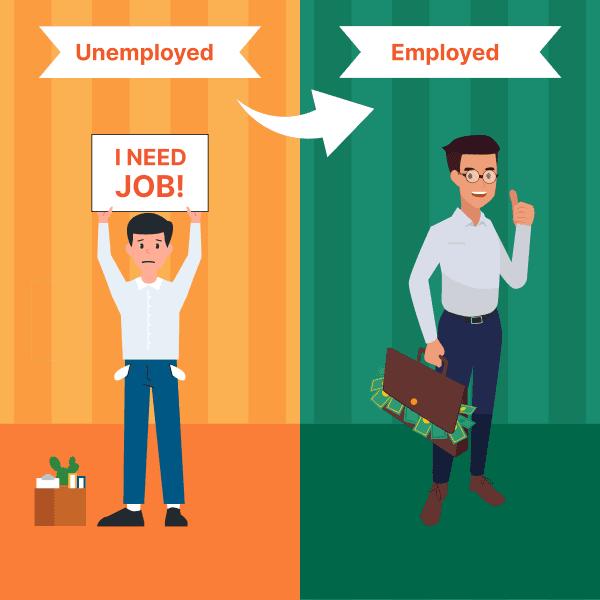It's common courtesy to send an email follow up after interview within 24 hours, expressing gratitude for the opportunity and reiterating your interest in the position. If a specific follow-up timeline was discussed during the interview, it's best to adhere to that schedule. However, if no timeline was provided, following up after about a week to 10 days is generally acceptable.
5 things to do after a job interview (and 3 big no-nos)

Ranita Tejwani

So, you've just nailed that job interview you've been working so hard for, and now you're left in a state of anxiety, eagerly waiting for a callback. What's this phase all about? It's what we call “post-interview etiquette.”
Think of it as the fancy set of rules and behaviors you should follow after a job interview. These guidelines cover everything from how to send that perfect thank-you email to staying informed and calm during this nerve-wracking waiting period.
This post-interview etiquette isn't just about politeness; it's about crafting a professional image. It's the secret sauce that leaves a lasting impression on your potential employer, even if the job doesn't land in your lap. Mastering this etiquette can be the difference between getting that dream job and maintaining a stellar reputation in your industry.
In this blog, we'll walk you through the post interview etiquette and provide you with a comprehensive guide on handling this crucial time.
What to do while waiting to hear back after an interview?
Review your performance in the interview
After you have already conquered your interview anxiety and walked out of that interview room, it's essential to take some time to reflect on the experience.
Assess how well you prepared, how effectively you communicated, and how you handled unexpected curveballs. A healthy self-assessment can help you identify your strengths and areas for improvement.
Here are some self-evaluation questions that you can ask yourself after the interview:
- Did I make a strong first impression?
- How did I respond to the interviewer's questions?
- Did I maintain good eye contact and body language during the interview?
- Did I highlight my abilities, successes, and skills?
- Were there any challenging questions I need to work on?
- What do I think of the company and the position?
- Is this the role I had in mind when I submitted my application?
- Did I end the interview on a positive note?

However, it's crucial not to overanalyze your performance. You don't want to fall into the trap of self-doubt. Instead, approach it with a constructive mindset. Think of it as an opportunity to learn and grow.
Take Elon Musk, for example. He's known for his intense self-reflection. He once said,
I think it's very important to have a feedback loop, where you're constantly thinking about what you've done and how you could be doing it better.
Send a thank-you email
Now, let's delve into the art of crafting the perfect thank you email after interview. Sending a thank you note post interview isn't just a polite gesture; it's a strategic move that can significantly influence the outcome of your job application. Sending your email as soon as possible following your interview is crucial. Try to follow up with the hiring manager within 24 hours of your interview.
How to write a post interview thank you email?

- Personalize it:
A well-crafted thank-you note or email is your chance to convey your sincere gratitude. Personalize it to show that you genuinely appreciate the time and effort the interviewer invested in you. Make it clear that you value their input and are excited about the potential future discussions. - Share highlights from the interview:
Avoid regurgitating what's already in your resume. Instead, focus on convincing the hiring manager that you are the perfect fit for the job. Share a few highlights from the interview, showcasing your strengths and the specific skills that make you the ideal candidate for the role. - Include anything you missed:
When talking about the importance of a thank you email, it offers a valuable chance to touch upon topics or aspects you didn't get to discuss in the interview. For instance, you can use the thank you email to bring up any additional qualifications or skills that you possess but didn't get to discuss in the interview, such as your proficiency in managing remote teams or your involvement in relevant volunteer work. - Express enthusiasm:
Your thank-you note is also an opportunity to express your excitement about the role and the company. For instance, you can mention what drew you to this particular company, your thoughts on its organizational culture, and how eager you are to contribute your unique skill set to enhance its success.
Let's peek at a thank-you email example:

Post interview thank you email template
Here's a template you can use to craft a well-rounded post interview thank you note:
Subject: Thank you for the interview opportunity.
Dear [Interviewer's Name],
I am sincerely grateful for the interview opportunity at [Company Name]. Your time and consideration mean a lot to me. I'm genuinely excited about the possibility of joining your team.
I was particularly impressed by [specific project or aspect discussed during the interview] during our discussion. It reinforced my belief that [Company Name] is the perfect place for me to contribute my skills and expertise. I'm eager to be part of a company with such a dynamic and innovative culture.
Once again, thank you for your time and consideration. I'm looking forward to the opportunity to contribute to [Company Name]'s success.
Warm regards,
[Your Full Name]
[Your Phone Number]
[Your Email Address]
Sending a thank you note alone won't get you the job, but not sending one will make you really stand out in a bad way. So, make sure you send a thank you note.
Practice patience and self-care
The post-interview waiting period can be incredibly stressful. A study by G2 highlighted that a whopping 73% of job seekers consider the job search process to be one of the most nerve-wracking experiences in life. So, if you're feeling the pressure, know that you're not alone.
The first thing to keep in mind is that uncertainty is a part of the journey. It's natural to feel anxious while awaiting that phone call or email. The key to managing this stress is practicing patience and self-care.
One powerful stress management technique is meditation. Take a few moments each day to sit in a quiet space, close your eyes, and focus on your breathing. Exercise is another excellent way to alleviate stress. Whether it's a brisk walk in the park, a yoga session, or an intense workout at the gym, physical activity releases endorphins, your brain's feel-good chemicals.
And, of course, there's comfort food. We all have our guilty pleasures when it comes to food. A bowl of warm soup, a slice of your favorite cake, or “Maa ke haath ka khana” can be a source of solace during the waiting period. Just remember, moderation is key!
The important thing is to find what works best for you. After all, the better you take care of yourself, the better equipped you'll be to handle whatever the future holds.
Continue job searching
Here's a crucial nugget of wisdom: Don't put all your eggs in one basket. It's all too tempting to focus solely on that one perfect job, but the job market can be extremely volatile and unpredictable. So, even if you feel like you aced the interview, it's wise to keep your job-hunting momentum.
Because let’s be honest, until you have a written job offer in hand, you technically don't have the job. It might sound harsh, but it's a reality check that's worth repeating. This means continuing to network, keep your options open, and apply for other positions.
Think of it this way - the worst (best) case scenario is that you receive multiple job offers. Now, that's a fantastic problem to have. It puts you in the driver's seat, giving you the power to choose the opportunity that suits you best.
But, you might wonder, how can you efficiently manage your job search? In the digital age, utilize AI-powered job sites like JobTatkal to boost your job search. With features like automatic profile creation, AI-based job recommendations, and CV enhancement, you increase your chances of finding a role that matches your skills, passions, and ambitions.
In essence, don't limit yourself to a single opportunity. Embrace technology, keep your job hunt active, and maximize your chances of landing your dream job. Your next big career move could be just around the corner, waiting for you to seize it.
India’s #1 Free AI-Powered Job Site
JobTatkal is an AI-powered match-making job site for job seekers and recruiters.
Plan for multiple outcomes
Lastly, approach the outcome with a positive mindset, regardless of what it may be. Think of it as a cosmic “win-win” situation. If you land the job, that's absolutely fantastic! You'll be on your way to exciting new horizons and career growth.
But what if the outcome isn't what you expected? Well, it's crucial to remember that it's not the end of the world. In fact, it might be the start of something even better. Life is full of opportunities; sometimes, rejection can be a blessing in disguise.
Think about the story of J.K. Rowling. Before becoming a household name with the Harry Potter series, she faced a series of rejections. However, she persisted and eventually found a publisher who believed in her work. So, when things don't go as planned, channel your inner J.K. Rowling and see it as an opportunity for growth and learning.
What not to do after a job interview?
Now let’s dive into the three things that you should never do after an interview.
Don’t stalk
Candidates are often plagued with the question of how to send a follow up email after an interview. Sending a follow-up email after interview can be tricky. Timing is everything. If you follow up too soon, you might come off as pushy. While not following up after an interview might push you into obscurity.
When to follow up after interview?
So, when should you hit that "send" button on your follow-up email? A general rule of thumb is to wait about a week after the interview. This time frame strikes the right balance between showing enthusiasm and giving the hiring team the space they need to decide.
How to follow up after an interview?
The content of your follow-up email is equally important. In your message, express your continued interest in the position. Remind them why you're a great fit and inquire about their timeline for making a decision. A well-crafted follow-up email can leave a lasting positive impression.
How to write a follow up email after an interview?
Below is a follow up email template after interview
Subject: Follow-Up on [Job Title] Interview
Dear [Interviewer's Name],
I hope this message finds you well. I wanted to express my gratitude for the opportunity to interview for the [Job Title] position at [Company Name]. It was a pleasure meeting you and your team during the interview process.
I am very excited about joining the [Company Name] team and contributing to the company's continued success. After our conversation, I am more enthusiastic about the role and the incredible team that I could become a part of.
As we discussed during the interview, my experience in [mention a relevant skill or experience] and my passion for [mention something you discussed during the interview] make me confident in my ability to excel in this role. I am eager to bring my skills and dedication to help [Company Name] achieve its goals.
Once again, thank you for considering me for this opportunity, and I look forward to the possibility of working with you and your team at [Company Name]. Please feel free to reach out if you need any additional information or have any further questions.
Thank you for your time and consideration.
Sincerely,
[Your Full Name]
[Your Phone Number]
[Your Email Address]
While following up is crucial, there's a fine line between being persistent and appearing overbearing. If the recruiter doesn’t seem to respond after the first follow up email, you may send them a connection request on LinkedIn (if not already a connection) and ask for an update on your application status. To avoid becoming a stalker in the eyes of your potential employer, DON’T barrage them with repeated follow-up messages.
If the recruiter does not respond to your follow up messages, it’s best to consider this avenue a dead end. Continue with your job search and move forward with your head held high!
Don't bluff
Imagine you gave multiple interviews and are fortunate enough to have a job offer from one of the companies. You should absolutely inform the other interviewers about this. Chances are this will urge them to fast-track your application. However, if they do not respond, you must consider the offer in hand.
However, DO NOT bluff your way into a job offer. While it might seem like a clever tactic, it can backfire spectacularly. For starters, the employer might catch on to your bluff and decide that they don't want to continue with your application. They may even give you their blessing to go ahead and accept the other offer, promptly crossing your name off their list.
But here's the real kicker: Even if you manage to secure the job through this untruthful tactic, you're setting yourself up for a rocky start in your employer-employee relationship. Starting a professional journey with a lie is never a wise move. If your dishonesty is discovered down the line, it could jeopardize your job security, leading to potential termination.
Don't brag on social media
It's tempting, right? That exhilarating feeling when you're certain you aced the interview, and you can't wait to share it with the world. But here's the scoop: even if you're convinced you've secured the job of your dreams, DON’T go overboard on social media as companies these days conduct comprehensive background checks, including candidates' social media handles, before offering them a job.
Let's take a lesson from Naomi, who learned this the hard way. She lost her coveted NASA internship because of an ill-advised social media post, and you definitely don't want to be in her shoes.

Remember to stay humble and grounded. The hiring process isn't over until you have an official offer in hand. Announcing your triumph prematurely can lead to embarrassment if things don't pan out. So, be cautious, and let your celebration come after you've got that official job offer.
You should also keep your cool if the company decides you are not the right fit. Resist that urge to vent your frustrations on social media or to your friends online.
Badmouthing a company or the people you interviewed with can have serious consequences. It's a small world, and you never know who's connected to whom. Your words can come back to haunt you.
Instead of venting, exit gracefully without burning any bridges. It's a professional approach and ensures you leave the door open for future opportunities.
In the world of career building, maintaining a positive reputation is essential. Don't let a moment of frustration lead to long-term regret.
To sum it up
The post-interview period is a phase where you can take control of your destiny. Post-interview etiquette matters because it shapes the employer's perception of you, influences their hiring decision, and maintains or enhances your professional reputation.
Even if you don't land the job, leaving a positive impression can lead to potential future opportunities, networking connections, or recommendations. You can navigate this uncertain period with grace and confidence by carefully following the above dos and don'ts.
Remember, the waiting game is part of the journey, and it's how you play it that truly matters.
Frequently Asked Questions
How long should I wait before following up after a job interview?
Can I ask for feedback if I don't get the job?
Yes, it's perfectly acceptable to politely request feedback from the interviewer or HR after you've been notified that you didn't get the job. Constructive feedback can be invaluable for your professional development and provide insights into areas you might improve or skills you could develop further.
What if the employer requests references during the waiting period?
If an employer requests references during the waiting period, consider it a positive sign in the hiring process. It indicates that you are being seriously considered for the position, and the reference check is often one of the final steps before an offer is extended. Respond promptly and professionally by providing the requested references with their contact information and a brief heads-up, if possible.

Ranita Tejwani
JobTatkal blog
Browse content tailored to your talent needs, and all the ways that you can get more out of JobTatkal.

Aiming for a career transition? Here's how you can successfully switch industries and stay relevant in your new job path....

Learn everything about the JobTatkal affiliate program and understand how to withdraw and use the rewards in India...

Explore the impact of moving from unemployment to employment on individuals and the economy. Learn how this transition transforms lives and fuels economic growth....

Confused between a job description and a job posting? Know the differences between the two and the importance of each....

Discover the ins and outs of salary negotiation with this guide. Learn how to confidently ask for a raise or negotiate a better salary....
